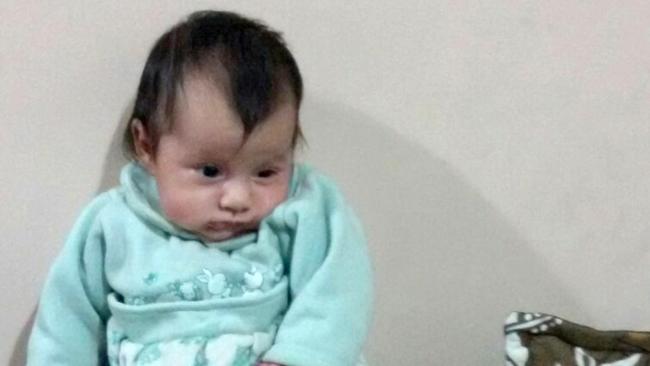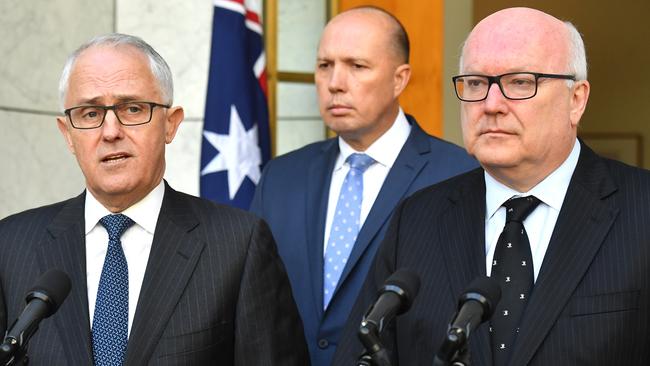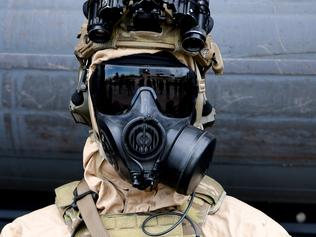Khaled Sharrouf kids alone in Syria after mother’s death
The Sharrouf children may be so affected by Syria experience they would have to be assessed on whether they pose a security risk.

The Sharrouf children may be so affected by their experiences in Syria that they would have to be assessed on whether they pose a risk to national security if they return to Australia, Immigration minister Peter Dutton has suggested.
Mr Dutton was unable to confirm that Tara Nettleton, the wife of notorious terrorist Khaled Sharrouf, had died last year, but told a Sydney radio station that their children, aged between 5 and 14, and their eight-week-old granddaughter, would have to be assessed before returning to Australia.
The Australian revealed today that the six children have effectively been left in the custody of Islamic State, with no sign of their father since claims were made that he died in an air strike last year.
“Just to play the hypothetical, if there’s an Australian citizen of any age, including and most definitely children, regardless of the circumstance, we would provide consular assistance to the grandmother and to the children,” he told 2GB.
“But the government’s clear objective is to keep the Australian public safe and we’d have to look at the individual circumstances to see what kids may have been through, what they’ve been exposed to, whether or not, later in life, they pose a threat.”
He said it would be near impossible for one of their sons, photographed holding a severed head of a Syrian soldier in the Islamic State capital, Raqqa, in 2014, to separate himself from those actions.
“I don’t think you ever can — that’s the reality,” he said. “It’s a barbaric act and you can only imagine what else these children have been exposed to. It just shows how evil and pervasive this death cult is.”
Opposition foreign affairs spokeswoman Tanya Plibersek said if the children can be returned to Australia safely, they should.
But she warned that it would be extremely difficult, particularly if the eldest child, Zaynab, decides she doesn’t want to leave.
“There is no question that taking these young children into that environment is child abuse. And, of course, if there is a safe way of assisting them I’d be in favour of that. I’m sad to say that it is pretty hard to see how the Australian government could help them,” Ms Plibersek told ABC’s Radio National.
“The report is that they’re being cared for by the eldest sister. If she’s not willing to leave Raqqa or even attempt to leave Raqqa, it becomes much more complex.”
Nettleton’s death came as her oldest daughter, 14-year-old Zaynab, gave birth to her first child, Ayesha, the product of her “marriage’’ to former Sydney boxer and Islamic State terrorist Mohamed Elomar, who was killed in a drone strike last June.
A picture of the dark-haired, eight-week-old girl, clad in heavy clothes to withstand the Syrian winter, recently appeared on one of Zaynab’s messaging apps.
Nettleton’s death has left the children, the youngest of whom is only five, to navigate the hardships, predations and terrors of life in the world’s most dangerous city without the parents who took them there.
The grim reality of the children’s life in Syria was grotesquely illustrated in 2014 when The Australian published photographs of Sharrouf’s eldest son, Abdullah, holding aloft the severed head of a Syrian official.
Nettleton’s death has also presented the Turnbull government with a fresh dilemma: how to help young Australian children whose lives are now at grave risk thanks to the decisions of their parents.
Yesterday, Nettleton’s mother Karen expressed her anguish at the loss of her daughter and the desperate, uncertain situation in which her grandchildren now find themselves.
“This has been the worst time of my life,’’ Karen Nettleton told The Australian. “I am devastated because I wasn’t able to be at my daughter’s side and that I’m not able to be there for my grandkids and great-grandchild, who are suffering traumatic events outside their control.’’
Tara Nettleton is believed to have died from an infection, possibly of the kidneys, that arose from a condition she had before she left Australia in February 2014. It is understood the condition led to her being hospitalised for a period of time at Sydney’s Royal Prince Alfred Hospital in 2013, where she underwent dialysis treatment.
The Australian has been told that Nettleton received some medical care in Raqqa, but facilities and treatments are primitive and priority is given to the Islamic State’s fighters. News of her death has not been confirmed by Australian authorities, who often find it difficult, if not impossible, to corroborate deaths inside Syria.
However, multiple government sources confirmed counter-terrorism agencies were aware of the reports and believed them to be true.
Attorney-General George Brandis said he could not confirm the reports of Nettleton’s death.
“(But) all Australians would be as appalled and disturbed as I am with parents who would willingly take up arms on behalf of ISIL, and expose their children to the risk of being injured, killed, or left to fend for themselves in areas controlled by these barbaric terrorists,’’ he said.
It appears that Zaynab is now responsible not only for her baby daughter but also for her four siblings: Hoda, 13; Abdullah, 11; Zarqawi, 10; and Humzeh, 5.
It is not known where in Raqqa the children are living but, before Elomar’s death and Sharrouf’s disappearance, the two families shared a house on the Euphrates River in Raqqa. Sharrouf and his family lived upstairs while Elomar was quartered downstairs.
Captured Yazidi women were also held at the house and were reportedly abused by the Sharrouf children and raped by Elomar, and possibly Sharrouf.
Ayesha’s birth begins a third generation of what has become a jihadist dynasty that began with Sharrouf, who was locked up in 2005 for his role in the Pendennis terror plot to bomb targets in Sydney and Melbourne.
A photo of his granddaughter that appeared on one of Zaynab’s messaging apps shows her perched unsteadily on some cushions as her head lolls forward. The small, balled hands still have the pink hue of a newborn, belied by the long — but thin — dark hair that sweeps down over the eyes.
Zaynab started calling herself Umm Hafs after marrying Elomar, who fought under the nom de guerre Abu Hafs. She recently changed her pseudonym to Umm Ayesha — meaning the mother of Ayesha, which, unlike Hafs, is a common girl’s name.
A Facebook account, now deleted, had also been created in the name Ayesha Sharrouf, with several Sydney women linked to the family listed as friends.
Elomar’s first wife, Fatima, was arrested in May 2014 after trying to board a plane to Malaysia with their four children, with wet-weather clothing requested by her then husband in her baggage.
She has pleaded guilty to providing support for Islamic State, and will be sentenced in April.
After Elomar was killed, Zaynab and Nettleton — along with fellow widow Zehra Duman from Melbourne and a US woman whose Australian husband was also killed — had to stay in their two-storey house on the outskirts of Raqqa for a compulsory mourning period of four months and 10 days.
Nettleton’s death means her children are effectively wards of Islamic State, with both parents dead or missing. Last June, Sharrouf vanished after Elomar was killed in the drone strike.
Reports that Sharrouf had also been killed were never confirmed and, as time passed, authorities began to suspect he had survived and was perhaps lying low in Raqqa, spooked by his friend’s death.
Authorities contacted by The Australian say there has been no trace of Sharrouf, meaning that even if he is alive he is not with his children.
The Syrian city of Raqqa is wholly controlled by Islamic State, also known as ISIL. Entry is strictly controlled and leaving is forbidden without the permission of the regime and hence highly dangerous. It is a place where atrocities such as public executions, beheadings and aerial bombardment by drone and Syrian air force jets are daily events.
Since their arrival in the city in 2014, the Sharrouf children have borne witness to all of this, making it a near certainty they have suffered psychological wounds.
Yesterday, the Nettletons’ lawyer, Charles Waterstreet, urged the government to do what it could to get the kids out.
“I encourage the authorities to do everything they possibly can to get those kids back to Australia,’’ Mr Waterstreet said.





To join the conversation, please log in. Don't have an account? Register
Join the conversation, you are commenting as Logout